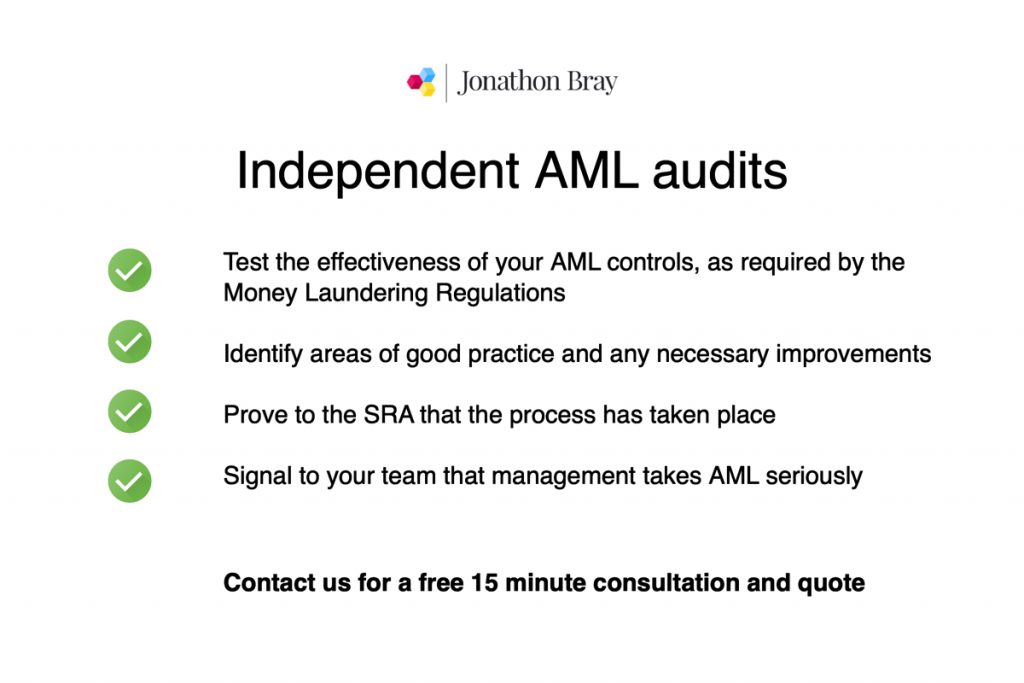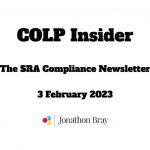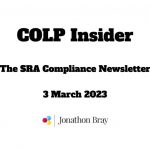Terrorist financing – the forgotten piece of AML compliance
Join us for our free webinar on this topic on 22 February at 12pm, in which we will explore some of the practicalities of terrorist financing compliance.
The Terrorism Act 2000 (TA) makes it an offence to finance terrorism. Terrorism is widely accepted to mean ‘the unlawful use of violence and intimidation, especially against civilians, in the pursuit of political aims’. Those political aims can take many forms, and the unlawful act is not the monopoly of any particular group of activists.
Terrorist financing is the collection of funds (legitimate or not) with the intention or knowledge that they will be used to finance terrorist activities (even if they are not actually used for those purposes).
As with the Proceeds of Crime Act 2002 (POCA), all practising solicitors are within scope of the TA. Unlike the Money Laundering Regulations, the TA does not just apply to a defined set of ‘transactional’ legal services, tax advice and ‘trust and company service’ work.
Terrorist financing compliance is a fundamental part of the Anti-money laundering (AML) framework, within which solicitors and law firms operate. The legislation operates hand-in-hand, sharing the similar offences and obligations. POCA and TA effectively mirror each other in certain respects.
But why does AML get all the attention?
ICYMI:Law firms with toxic cultures ‘should’ face disciplinary tribunal
A recent joint statement on referrals to the tribunal published by the SRA aims to give some clarity about the types of disciplinary cases which will end up at the tribunal.
With the SRA’s newly increased fining powers, cases that will no longer be referred to the SDT will include some relatively serious breaches of conduct rules with a high degree of personal culpability, where a fine is an appropriate sanction.
However, the most serious cases of unethical behaviour (e.g. dishonesty), instances of repeated low level breaches, and those cases where oral evidence is necessary will continue to be referred to the tribunal.
One of the categories of cases highlighted in the joint statement that ‘should typically be referred to the SDT’ relates to toxic workplace culture.
News and Guidance

SRA Updates
- Updated guidance – Do I need to operate a client account?
- Conduct in disputes thematic review – SRA provides snapshot of SLAPPs compliance in 25 ‘reputation management’ law firms. It found a generally good level of understanding about SLAPPs, although it appears that the process may have unearthed some potential SLAPP cases self-referred by the firms in question, which are now under investigation. The regulator expressed dismay at the low level of awareness of its guidance on conduct in disputes. (Maybe because it’s buried in the rest of the guidance?) There was also a concerning lack of understanding of the reporting duty.
- SRA Board finalises rules for post six-year client protection – new rules to replace SIF to be placed before the LSB for approval. There will be no additional levy on the profession ‘in the near future’.
- SRA confirms updated approach to fines and publishing decisions – due to come in later this year, the new rules will see decisions being publicised for longer, the introduction of fixed tariff penalties, with other fines linked to the solicitor/firm’s income and turnover.
Law Society – New and updated practice notes (may require login)
- HR and people management feature – Toxic productivity and how to tackle it in the workplace
- What’s changing – Changes to the Legal Ombudsman scheme rules
- Q&A – I’m COLP. What should I do if there’s a compliance breach at my firm?
Other Updates
Free webinars

Last chance to view the recording: GDPR turns 5!
Led by our in-house data protection practitioner, Rachael Eyre, the session covers:
- GDPR basics
- How data protection ties in with duties of confidentiality
- The future for the UK GDPR
- Data Processes / Data Maps – the foundation of your Data Protection Regime
To access the recording, click here and use passcode =#4s7*ZU – available for 7 days.
Next webinar: Terrorist financing – the forgotten piece of AML compliance
Invitations have been sent out for this session to be held on 22 February at 12pm. We will look at how and why terrorist organisations might use a legal transaction to raise funds, some red flags to look out for, and what you need to do to remain compliant.
As always, the recording link will be in the following newsletter.
SRA and SDT disciplinary decisions

- Farrukh Abbas – struck off for making a dishonest personal injury claim (the paralegal who ran the claim was the driver)
- Ian Caunt Wilson – struck off for stashing over £200,000 worth of cheques in a real-life ‘cabinet of chaos’, so they appeared as paid but un-presented on the firm’s ledgers.
- Christopher Kenneth Scroggs – struck off for asking a client to pay him directly, rather than the consultant law firm he practised through.
- William Richards – fined £2,000 following convictions for drink driving and breach of shotgun licence offences.
- Analiza Abella Kjaer – struck off for disappearing with over £130,000 of client money.
- Janine Wilkinson – struck off following conviction for false representation, after impersonating a friend in order to obtain prescription drugs.
- Alison John – fined £6,000 (by the SRA under its new powers) for failings relating to the administration of an estate and complaints handling.
- Alvin Gilbert Just – struck off for sending inappropriate and threatening emails to an opposing barrister.









